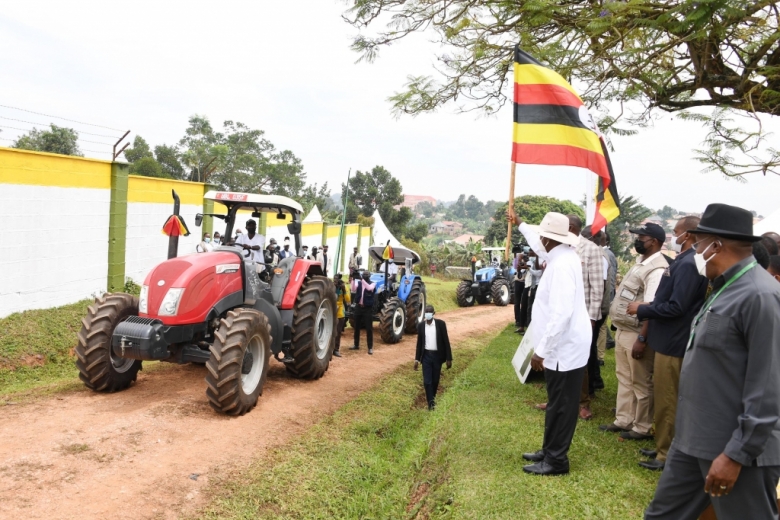Partly co-owned by Columbian Honorary Consul Rao Mohana, agricultural equipment and inputs dealer company Construction & Farm Equipment (CAFE) risks being blacklisted for recently frustrating the Government of Uganda efforts to improve the country’s collective agricultural mechanisation capabilities.
In a bid to achieve adequate mechanisation, which is key in President Museveni’s efforts to boost production and in the process enlarge export volumes while addressing food security-related concerns, the GoU rightly realises that the tractors’ stock in the country has to be upscaled and enlarged.
We currently have around 5,000 tractors as a country (75% of it government’s) and this stock is what we have collectively a cumulated and kept replenishing as a country since independence in 1962. Yet knowledgeable GoU sources say that, to ideally respond to and match our contemporary mechanisation needs, we ought to be expanding our tractors’ fleet or stock as a country by acquiring at least 10,000 tractors annually.
It’s against this background that the GoU towards the end of 2021 improvised and put together a fund of Shs8 billion to facilitate the purchase of at least 40 tractors (of the Landini model and not Sonalika) in order to support PDM-related agricultural activities in several districts including Nwoya, Kaliro, Kibale, Kyenjojo, Dokolo and others.
At the end of the bidding process, the contract to supply the 40 tractors was awarded to CAFE which had to deliver them promptly while strictly adhering to contract specifications as was designed by the engineers from the Ministry of Agriculture under close supervision and approval from their counterparts at the Works Ministry. To ensure compliance with high quality standards, the contract specs strictly required supply of Landini model of tractors basically manufactured from a European country.
The automobiles manufacturing has evolved over time to the extent that the original manufacturer will provide the vehicle constituent parts and have the assembly (of say the tractors) done elsewhere but on behalf and in the name of the same brand manufacturer. In this case, all the major manufacturing work would be done in Italy though the actual tractors would be assembled in India. The bid document clearly set out all this and the country of origin for the 40 tractors was disclosed as having to be India from where the assembling of the tractors was to be done.
All these requirements were well captured in the contract document that was subsequently validated and approved by the AG chambers through the office of Solicitor General (between the GoU/MAAIF and CAFE).
There was a requirement for the Performance Guarantee covering up to Shs2.4bn to secure the advance payment the contract provisions required the GoU to make to enable the contractor (CAFE) deliver as was obliged.
However, in the end the contractor (who was supposed to strictly deliver 40 tractors of the Landini model assembled in India as country of origin) got constrained and failed to deliver the contracted volume of goods (namely the 40 tractors) on time. They asked for extension of time within which to fully meet their contractual obligations.
Out of the contracted 40 tractors, CAFE ended up delivering 21 within the stipulated time and this amounted to breaching key contractual provisions, prompting the relevant GoU MDA to fall back on the Shs2.4bn tied up in the Performance Guarantee which the contractor had executed through ABSA Bank.
The contractor, who has had to lose and forfeit the Shs2.4 billion, at some point asked for extension of time within which to deliver but this wasn’t entertained as the relevant GoU MDA prioritized recovering under the Performance Guarantee which made Shs2.4 billion available (to the GoU) at all times for indemnification purposes.
In agreeing on which tractor model was appropriate, MAAIF engineers were mindful of what would work in relation to the type of terrain, type of soil etc that was prevalent in the different Ugandan districts or even regions that were meant to receive the tractors under farmer groups to facilitate agricultural mechanisation to amplify food security in the different regions.
Now for its failure to comply with the required tractor specifications and delivering the full job 100% on time, CAFE risks being blacklisted by the regulator PPDA: implying the company won’t be able to do any business with government or supply anything for the next five years or more. Otherwise, the 21 tractors that were delivered within stipulated time have done great work and facilitated the intended mechanisation processes in the recipient districts-including Nwoya in Acholi being one of them.
Uganda’s unenviable tractors available and statistics situation is further complicated by ever escalating intrigue among key players and suppliers of the same operating in Uganda. One of the reputable ones is a company called Engineering Solutions based in Nsambya opposite the US Embassy. Headed by a European expatriate who has lived and traded in tractors (originally Massy Fergusion which were high quality but became unviable because of cost-related complications) for more than 40 years and managed for the sales purposes by an aggressive Musoga sales executive, this Nsambya-based company has for long been associated with plenty of rubble-rousing.
M7 UNDETERRED:
All these competition and CAFE-related setbacks notwithstanding, President Museveni remains determined to accelerate mechanisation while boosting production for export and food security through prioritising the PPP model. That’s how the government mechanisation center facility at Namalere (241 acres) along Bombo Road was last year surrendered to Cooper Motors Corporation (CMC) to facilitate accelerated assembling of tractors.
At the instigation of the President who authored a Presidential directive, the GoU entered into an MoU resulting into a three-year framework contract obliging the very credible CMC to assemble and make available hundreds of tractors to increase on the country’s stock while at the same time addressing affordability-related concerns.
The President, who rightly remains very keen on agricultural mechanisation, has consistently demanded that the tractors which the government purchases have to be assembled here in Uganda locally in order to enable the Ugandan youths benefit from the resultant job creation while making the acquisition of tractors cheaper and more affordable to both the government and non-state actors. Gratefully, the CMC thing seems to be turning out to be an effective pilot so far. Already 240 tractors, locally assembled, have been completed and passed on to the GoU under the three-year framework contract with CMC.
Gen Museveni is specifically excited with the fact that under the CMC PPP arrangement, the GoU is parting with merely Shs101m to acquire each of the locally assembled tractors as opposed to Shs121 million it would ordinarily have cost the taxpayer.
It’s also worth noting from the MAAIF statistics and research that of the 5,000 tractors our country Uganda currently has, up to 75% of them are government-owned; leaving the rest of the players (especially NGOs, faith-based organisations and a few large scale individual commercial farmers) to do with the remaining 25%. This appalling state of affairs is what President Museveni is determined to address through popularising the PPP like the one currently ongoing between the GoU and reputable automobiles company CMC that is based in Nakawa along Kampala-Jinja High way.








